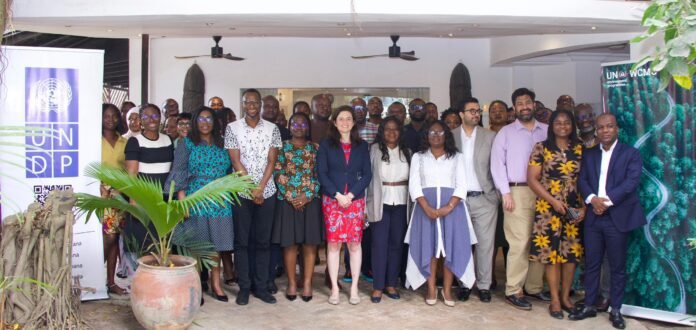With funding from the United Kingdom’s Department for Environment, Food and Rural Affairs (DEFRA) through the Global Centre on Biodiversity and Climate, the UN Environment Programme World Conservation Monitoring Centre (UNEP-WCMC), in collaboration with the United Nations Development Programme (UNDP), and in partnership with the Ministry of Finance, Ministry of Environment, Science and Technology (MEST), the National Development Planning Commission (NDPC), Council for Scientific and Industrial Research (CSIR), the Centre for Biodiversity Conservation Research (CBCR) and the Ghana Statistical Service (GSS), under the Nature Transition Support Programme (NTSP) is supporting the development of a national roadmap to transition toward a nature-positive economy in Ghana.
To advance this effort, a two-day workshop titled “Building a Nature-Positive National Economic Transformation Roadmap” was held to co-design and validate the roadmap. This initiative aims to support Ghana’s shift toward a nature-positive economy by integrating biodiversity and ecosystem services into economic and fiscal planning as part of the broader National Economic Transformation Roadmap.
Speaking at the workshop, Dr. Abdul-Razak Saeed, UNDP Ghana’s Head of Environment and Climate Cluster, emphasized the importance of mainstreaming nature into national development strategies. He stated, “This workshop is more than a results-sharing platform — it’s a call to action for all sectors to integrate nature into Ghana’s economic and fiscal planning. Aligning our development pathways with the Sustainable Development Goals (SDGs) and the Kunming–Montreal Global Biodiversity Framework is key to a sustainable and inclusive future.”
He reaffirmed UNDP Ghana’s commitment to supporting this agenda, adding that the organization remains dedicated to exploring innovative financing and partnerships that drive nature-positive development, including through the Biodiversity Finance Initiative (BIOFIN).
Dr. Michael Kusi Appiah, the Chief Analyst responsible for macroeconomic modeling at the NDPC, highlighted the importance of the workshop in fostering a holistic approach to development. He noted that, “As we pursue growth and job creation, we must remain mindful of the hidden social and ecological costs of unsustainable resource use. This initiative reflects our commitment to aligning economic prosperity with the health of our natural environment, ensuring long-term sustainability for all.”
Presenting an overview of the NTSP programme, Hamza Butt, a Programme Officer in the Nature Economy team at UNEP-WCMC, stressed the importance of reconciling economic growth with environmental sustainability. He explained that the initiative is being implemented in five countries, notably Ghana, Ecuador, Colombia, Indonesia, and Vietnam, with Ghana now at a critical stage where findings are ready for dissemination.
He also outlined four key pillars that underpin the programme’s approach to sustainable development, namely country engagement, integrated economic ecological modelling, political economic analysis, and policy coherence, along with the exploration of alternative development pathways. These pillars are intended to guide decision-making, promote cross-sector collaboration, and support the formulation of policies that harmonize economic growth with environmental sustainability.
Adding to the discussion, Dr. Ishmael Nii A. Doodoo, Director and Head of Innovative Finance, Partnerships and Markets, 24-Hour Economy and Accelerated Export Development (24 H+) Secretariat at the Office of the President-Ghana, stated that, “The NTSP Project presents timely opportunities that can significantly shape the second phase of Ghana’s 24-Hour Economy. We must harness these insights in a structured and strategic manner. Building professional capacity within the nature-positive sector is key to unlocking sustainable growth. We are ready to explore this space further, through partnerships, innovation, and financing, to ensure nature is fully integrated into our national development agenda.”
The workshop provided a platform for reviewing risks, sharing results, and building consensus on Ghana’s way forward in embedding environmental accountability into its economic transformation efforts.








